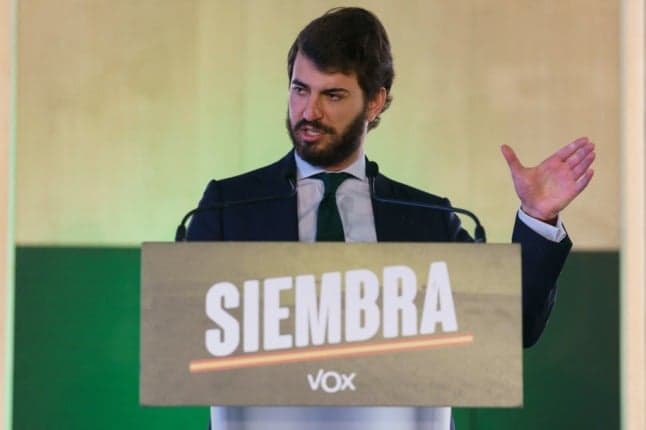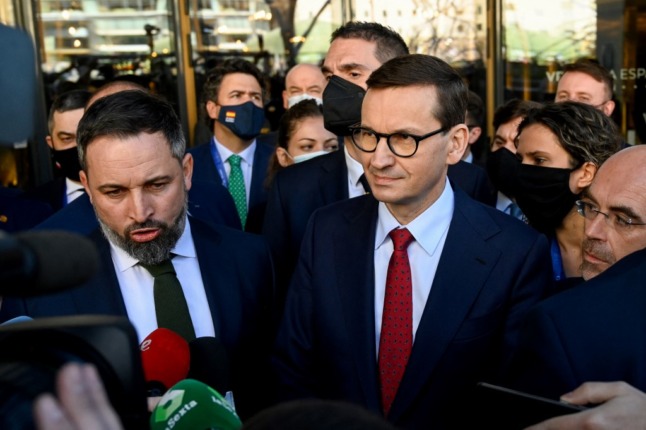Spain's far-right Vox party poised to enter Castilla y León government

Spain's far-right party Vox is poised to enter a regional government for the first time after big election gains over the weekend, suggesting a blueprint for future power sharing nationally.
Vox came third in Sunday's snap polls in the central Castilla y León region, winning 13 seats in the 81-seat assembly, up from just one.
It is now demanding it form part of a coalition government with the conservative Popular Party (PP) which came first with 31 seats -- two more than in 2019 but well short of an absolute majority.
"Vox has the right and the duty to form a government in Castilla y León," Vox leader Santiago Abascal said late on Sunday.
The party also wanted the vice-presidency of the regional government, he added.
The voters "have spoken" and "we will demand nothing more nor less than what is due to us," Abascal said.
The formation of a PP-Vox government could be a foretaste of a right-wing alliance that might govern Spain after the next general election due before the end of 2023.
Most recent polls put the PP first, ahead of Prime Minister Pedro Sánchez's ruling Socialists, but short of a majority -- and that would mean they might have to form an uncomfortable alliance with Vox to govern.
The Socialist party came second in Castilla y Leon with 30 percent of the vote, giving it 28 seats.
Spain's highly decentralised system gives its 17 regions broad powers, which means the entry of Vox into a regional government would have a major impact on policy.
Castilla y León could serve as a "lab" for Vox, said Paloma Roman, a politics professor at the Complutense University of Madrid.
The party called for the repeal of a law designed to protect victims of domestic violence and opposes both gay marriage and Gay Pride marches.
Founded in 2014, Vox started as a marginal force in Spanish politics before causing a major upset in late 2018 when it entered regional parliament for the first time, winning seats in the assembly of the southern Andalusia region.

VOX leader Santiago Abascal (L) and Poland's Prime Minister Mateusz Morawiecki talk to the press following the far-right and nationalistic "Defend Europe" summit organised by VOX in Madrid in late January. (Photo by OSCAR DEL POZO / AFP)
Following national elections nearly a year later, it became the third-largest force in Spanish politics with 52 seats in the 350-seat parliament, mirroring gains elsewhere in Europe for the far right.
The regional governments of both Andalusia and the Madrid area are PP-led but supported from the outside by Vox in exchange for political concessions.
The election was called by Castilla y León's current PP leader Alfonso Fernández Mañueco after he broke with Ciudadanos, his centre-right coalition partner which lost almost all its seats.
The demise of Ciudadanos is leaving the PP with virtually no other potential partner other than Vox.
"The PP won the elections... but it is in the hands of Vox," said Cristina Monge, a political scientist at the University of Zaragoza.
Pablo Simón, a politics professor at Carlos III University in Madrid, agrees. The PP, he said, "has no other choice than to make way for its main rival further on the right which is Vox".
But this coalition could become a problem "if the PP wants to form alliances with moderate partners" in other regions or at the national level, he added.
Fernández Mañueco has left the door open to forming a coalition government with Vox, saying there was no "red line" between the right and far right. But some top PP figures have expressed doubts.
"Coalition governments do not provide stability," PP secretary general Teadoro Garcia Egea, the party's number two, said Monday.
At Complutense University, Roman argued that a PP-Vox government in Castilla y Leon could turn voters off Vox once they got a closer look at their policies.
This could lead voters to impose a "sanitary cordon" around the party, she added.
READ MORE: Why elections in little-known Castilla y León really matter for Spain's future
Comments
See Also
Vox came third in Sunday's snap polls in the central Castilla y León region, winning 13 seats in the 81-seat assembly, up from just one.
It is now demanding it form part of a coalition government with the conservative Popular Party (PP) which came first with 31 seats -- two more than in 2019 but well short of an absolute majority.
"Vox has the right and the duty to form a government in Castilla y León," Vox leader Santiago Abascal said late on Sunday.
The party also wanted the vice-presidency of the regional government, he added.
The voters "have spoken" and "we will demand nothing more nor less than what is due to us," Abascal said.
The formation of a PP-Vox government could be a foretaste of a right-wing alliance that might govern Spain after the next general election due before the end of 2023.
Most recent polls put the PP first, ahead of Prime Minister Pedro Sánchez's ruling Socialists, but short of a majority -- and that would mean they might have to form an uncomfortable alliance with Vox to govern.
The Socialist party came second in Castilla y Leon with 30 percent of the vote, giving it 28 seats.
Spain's highly decentralised system gives its 17 regions broad powers, which means the entry of Vox into a regional government would have a major impact on policy.
Castilla y León could serve as a "lab" for Vox, said Paloma Roman, a politics professor at the Complutense University of Madrid.
The party called for the repeal of a law designed to protect victims of domestic violence and opposes both gay marriage and Gay Pride marches.
Founded in 2014, Vox started as a marginal force in Spanish politics before causing a major upset in late 2018 when it entered regional parliament for the first time, winning seats in the assembly of the southern Andalusia region.

Following national elections nearly a year later, it became the third-largest force in Spanish politics with 52 seats in the 350-seat parliament, mirroring gains elsewhere in Europe for the far right.
The regional governments of both Andalusia and the Madrid area are PP-led but supported from the outside by Vox in exchange for political concessions.
The election was called by Castilla y León's current PP leader Alfonso Fernández Mañueco after he broke with Ciudadanos, his centre-right coalition partner which lost almost all its seats.
The demise of Ciudadanos is leaving the PP with virtually no other potential partner other than Vox.
"The PP won the elections... but it is in the hands of Vox," said Cristina Monge, a political scientist at the University of Zaragoza.
Pablo Simón, a politics professor at Carlos III University in Madrid, agrees. The PP, he said, "has no other choice than to make way for its main rival further on the right which is Vox".
But this coalition could become a problem "if the PP wants to form alliances with moderate partners" in other regions or at the national level, he added.
Fernández Mañueco has left the door open to forming a coalition government with Vox, saying there was no "red line" between the right and far right. But some top PP figures have expressed doubts.
"Coalition governments do not provide stability," PP secretary general Teadoro Garcia Egea, the party's number two, said Monday.
At Complutense University, Roman argued that a PP-Vox government in Castilla y Leon could turn voters off Vox once they got a closer look at their policies.
This could lead voters to impose a "sanitary cordon" around the party, she added.
READ MORE: Why elections in little-known Castilla y León really matter for Spain's future
Join the conversation in our comments section below. Share your own views and experience and if you have a question or suggestion for our journalists then email us at [email protected].
Please keep comments civil, constructive and on topic – and make sure to read our terms of use before getting involved.
Please log in here to leave a comment.